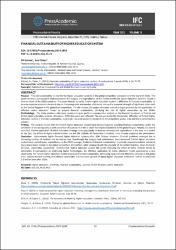| dc.contributor.author | Eşkinat, Ali | en_US |
| dc.contributor.author | Teker, Suat | en_US |
| dc.date.accessioned | 2024-02-14T07:51:15Z | |
| dc.date.available | 2024-02-14T07:51:15Z | |
| dc.date.issued | 2024-01-15 | |
| dc.identifier.citation | Eşkinat, A. & Teker, S. (2024). Financial sustainability of higher education system. PressAcademia Procedia, 18(1), 71-72. doi:10.17261/Pressacademia.2023.1854 | en_US |
| dc.identifier.issn | 2459-0762 | en_US |
| dc.identifier.uri | https://hdl.handle.net/11729/5899 | |
| dc.identifier.uri | http://dx.doi.org/10.17261/Pressacademia.2023.1854 | |
| dc.description.abstract | Purpose- Financial sustainability is vital for the higher education systems in the global competitive atmosphere of the world of 2020s. This paper reviews a comparative analysis between the budgets and expenditures of the Turkish and British higher education systems, beside a view on those of the OECD countries. This paper intends to clarify Turkish higher education system’s difficulties in financial sustainability to provide required academic standards due to increasing costs and number of students versus the economic strength of significant actors such as the United Kingdom in the globalized competition. For this reason, this paper advocates cost advantages provided by the application of effective online education model to acquire financial sustainability clarifying the rise of digital universities by the 2030s. Methodology-. The study employs a literature review aiming to perform a comparative analysis on the financial structures of Turkish and British higher education systems. Moreover, OECD data were also reflected. The aim was to identify the possible difficulties of Turkish higher education system in financial sustainability to provide required academic standards in the competitive global area and find a contemporary solution. Findings- The analysis reveals that the Turkish higher education system have disadvantages in providing financial sustainability under the conditions of increasing costs as well as number of students in order to reach the required standards in the global league. Notably, it is clearly seen that efective application of online education strategy is an opportunity to balance revenues and expenditures in this way. As a matter of the fact, the effect of digital transformation era and the attitude of Generation Z students have already prepared this atmosphere. Conclusion-. Governments highly financed higher education systems after 20th Century. However, financial problems emerged due to increasing number of students and increasing costs. Eventhough the budgets had continuously been increased, Turkish higher education system have realized lower expenditures in the OECD average. Problems in financial sustainability to provide required academic standards have clearly been noticed in the global competitive atmosphere while compared with the example of the United Kingdom. Over the Covid19 crisis, universities successfully implemented hybrid education around the world increasing the effect of online systems forced by Generation Z’s perspective on embracing Digital Technologies. So, effective application of online education model appeared as a new opportunity for Turkish higher education system to provide financial sustainability decreasing costs and also efficiently compete in the global area. Indeed, blended learning in traditional universities and inevitable growth of digital higher education institutions named as University 5.0 will be seen after 2030s. | en_US |
| dc.language.iso | en | en_US |
| dc.publisher | PressAcademia | en_US |
| dc.relation.ispartof | PressAcademia Procedia | en_US |
| dc.rights | info:eu-repo/semantics/openAccess | en_US |
| dc.subject | Higher education | en_US |
| dc.subject | University | en_US |
| dc.subject | Financial sustainability | en_US |
| dc.subject | Turkiye | en_US |
| dc.subject | United Kingdom | en_US |
| dc.subject | Online education | en_US |
| dc.title | Financial sustainability of higher education system | en_US |
| dc.type | Article | en_US |
| dc.description.version | Publisher's Version | en_US |
| dc.department | Işık Üniversitesi, İktisadi, İdari ve Sosyal Bilimler Fakültesi, İşletme Bölümü | en_US |
| dc.department | Işık University, Faculty of Economics, Administrative and Social Sciences, Department of Management | en_US |
| dc.authorid | 0000-0002-7981-3121 | |
| dc.authorid | 0000-0002-7981-3121 | en_US |
| dc.identifier.volume | 18 | |
| dc.identifier.issue | 1 | |
| dc.identifier.startpage | 71 | |
| dc.identifier.endpage | 72 | |
| dc.peerreviewed | Yes | en_US |
| dc.publicationstatus | Published | en_US |
| dc.relation.publicationcategory | Makale - Ulusal Hakemli Dergi - Kurum Öğretim Elemanı | en_US |
| dc.institutionauthor | Teker, Suat | en_US |


















